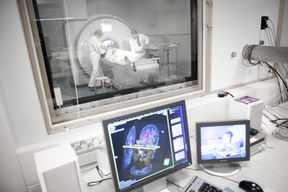Researchers are developing a mobile MRI that could fit in a van instead of a lorry

MRI imaging is one of the best ways of examining different body tissue and obtaining information about injuries and illnesses. However, MRI scanners are typically large, heavy, and very expensive devices that need to be operated by specially trained healthcare personnel.
Aalto University has just launched a project that studies and builds new magnetic resonance imaging technology, which enables lighter, cheaper and more mobile solutions compared to current equipment. Mobile MRI equipment currently in use are the size of a lorry, but devices based on the new technology would fit in a van.
‘The novel MRI technology uses a magnetic field that is weaker than the one used in traditional MRI imaging, which allows the equipment to be significantly smaller’, says Aalto Assistant Professor Ilkka Laakso.
The technology is based on the use of permanent magnets instead of superconducting electromagnets. In a permanent magnetic material, the magnetic field is persistent, while in electromagnets, it is produced by an electric current.
The image quality of a low-field MRI scanner is not as accurate as that of high-field scanners, but it is still sufficient for many purposes. It could be used for diagnosis of inflammatory diseases such as pneumonia and maxillary sinusitis, internal bleeding, abscesses and fluid deposition. Small and mobile scanning equipment could also be utilised in refugee camps or other emergency locations.
Precision devices for various purposes
Researchers at Aalto University have been developing the technology for the past few years and are now ready to start testing the prototype shortly. In the project being launched, the aim is to develop the technology further and to find suitable applications.
The researchers are aiming at developing a device that could be used at a low threshold because it does not require similar special preparations, special facilities and training as the use of high-field equipment. The operating costs are also lower.
In addition to healthcare, the technology could also be used in such fields as the wellness sector, which would a completely new application for MRI imaging. For example, fitness centres could use it for measuring body fat percentage.
‘The technology can be imported to applications where it has not been used before. It can lead to new applications or replace existing technologies and, in the best case, also increase resource efficiency’, says professor and designer Severi Uusitalo.
The mobile MRI technology is being developed in a multidisciplinary cooperation project. Assistant Professor Ilkka Laakso and Professor Anouar Belahcen from the Department of Electrical Engineering and Automation in the School of Electrical Engineering and their teams are developing computational modelling for the equipment and designing the design of the magnetic structure, respectively. A team led by Professor Severi Uusitaloof the Department of Design at the School for Arts, Design and Architecture, plans the applications and design language of the equipment. Aalto Design Factory is involved in the implementation and mechanical design of the device.
The three-year project is funded by the Technology Industries of Finland Centennial Foundation, and the Jane and Aatos Erkko Foundation. The foundations have granted a total of EUR 750,000 to the project.
More information
Read more news

Aalto University is introducing ORCID’s Researcher Connect service
Aalto University is introducing ORCID's Researcher Connect service, which facilitates information transfer between researchers' ORCID profiles and the university's research information management system, ACRIS.
Nature of Process: Exhibition by the students of the ‘Personal Exploration’ Course
Nature of Process is a multi-material exhibition of 14 Master´s students of Aalto ARTSEden Telila's master's thesis contributed to Ramboll's geotechnical toolkit
Geoengineering alum Eden Telila helped Ramboll automate manual tasks.






